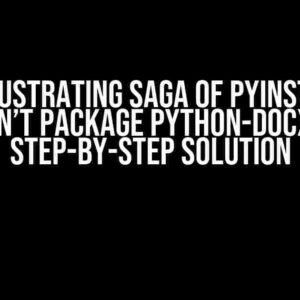Are you tired of MyPy throwing errors in mapping with union types? Do you struggle to understand why your code is failing to type-check despite following the official documentation? Fear not, dear developer, for we’ve got you covered! In this article, we’ll delve into the world of MyPy and explore the common pitfalls that lead to errors in mapping with union types. By the end of this guide, you’ll be equipped with the knowledge to tackle even the most stubborn type-checking issues.
What is MyPy and Why is it Throwing Errors?
Mypy is a popular static type checker for Python that helps catch type-related errors before runtime. It’s an essential tool for ensuring code quality and preventing pesky runtime errors. However, MyPy can sometimes throw errors when dealing with complex data structures like mappings (i.e., dictionaries) with union types. But why does this happen?
The Problem with Union Types in Mappings
In Python, union types are a way to specify multiple types for a single variable. For instance, you might have a variable that can be either an integer or a string: `Union[int, str]`. However, when it comes to mappings, things get a bit more complicated. Mappings have keys and values, and when you use union types in mappings, MyPy can get confused about the types involved.
Consider the following example:
from typing import Union, Mapping
my_mapping: Mapping[str, Union[int, str]] = {'a': 1, 'b': 'hello'}
At first glance, this code looks perfectly valid. You’re defining a mapping with string keys and values that can be either integers or strings. However, when you run MyPy on this code, you might get an error like this:
error: Value of type variable "_T" of "Mapping" must be a type [type-var]
my_mapping: Mapping[str, Union[int, str]] = {'a': 1, 'b': 'hello'}
Understanding the Error Message
The error message might seem cryptic, but it’s actually telling us that MyPy is struggling to determine the type of the mapping’s values. The `_T` type variable is a placeholder for the type of the values, and MyPy is complaining that it can’t figure out what that type should be.
So, what’s going on here? The issue lies in the way MyPy handles union types in mappings. When you define a union type in a mapping, MyPy tries to create a single type that encompasses all the possible types in the union. In this case, that means trying to create a type that’s both an integer and a string, which doesn’t make sense.
Solving the Error with Type Aliases
One way to solve this issue is by using type aliases. A type alias is a way to give a complex type a shorter name, making it easier to work with. In our case, we can create a type alias for the union type:
from typing import Union, Mapping, TypeAlias
MyType: TypeAlias = Union[int, str]
my_mapping: Mapping[str, MyType] = {'a': 1, 'b': 'hello'}
By defining a type alias `MyType` for the union type, we’re effectively giving MyPy a single type to work with. This makes it easier for MyPy to determine the type of the mapping’s values, and the error should disappear.
Alternative Solutions
Type aliases are just one way to solve the issue. There are other approaches you can take, depending on your specific use case.
Using the `TYPE_CHECKING` Constant
from typing import Union, Mapping, TYPE_CHECKING
if TYPE_CHECKING:
my_mapping: Mapping[str, Union[int, str]] = {'a': 1, 'b': 'hello'}
The `TYPE_CHECKING` constant is a special value that’s only `True` during type-checking. By wrapping your mapping definition in an `if TYPE_CHECKING:` block, you’re telling MyPy to ignore the definition during runtime, but still perform type-checking on it.
Defining Separate Mappings for Each Type
In some cases, you might need to define separate mappings for each type in the union. This approach can be more verbose, but it provides explicit type information for MyPy:
from typing import Mapping
my_int_mapping: Mapping[str, int] = {'a': 1, 'c': 3}
my_str_mapping: Mapping[str, str] = {'b': 'hello', 'd': 'world'}
By defining separate mappings for each type, you’re giving MyPy explicit type information, making it easier for the type checker to understand your code.
Best Practices for Working with Mappings and Union Types
Now that we’ve explored the common pitfalls and solutions, let’s discuss some best practices for working with mappings and union types:
- Use type aliases for complex union types: As we saw earlier, type aliases can help simplify complex union types and make them easier to work with.
- Define separate mappings for each type when possible: When you can, define separate mappings for each type in the union. This provides explicit type information and makes it easier for MyPy to understand your code.
- Use the `TYPE_CHECKING` constant for type-checking only: If you only need to define a mapping for type-checking purposes, use the `TYPE_CHECKING` constant to wrap your definition.
- Keep your union types simple: Try to avoid using complex union types with multiple levels of nesting. This can make it harder for MyPy to understand your code and may lead to errors.
Conclusion
In this article, we’ve explored the common issues that arise when working with MyPy and mappings with union types. We’ve seen how to solve these issues using type aliases, the `TYPE_CHECKING` constant, and defining separate mappings for each type. By following the best practices outlined in this guide, you’ll be well-equipped to tackle even the most complex type-checking issues in your code.
| Solution | Description |
|---|---|
| Type Aliases | Simplify complex union types using type aliases |
| `TYPE_CHECKING` constant | Use for type-checking only, ignoring runtime definitions |
| Separate Mappings | Define separate mappings for each type in the union |
Remember, MyPy is a powerful tool that can help you catch type-related errors before runtime. By understanding how to work with mappings and union types, you’ll be able to write more robust and maintainable code.
Frequently Asked Questions
Got stuck with Mypy throwing errors in mapping with union? Don’t worry, we’ve got you covered! Here are some frequently asked questions to help you troubleshoot the issue.
Why does Mypy throw an error when using a union type in a mapping?
Mypy throws an error because it’s trying to ensure type safety. When you use a union type in a mapping, Mypy gets confused about what type to expect for the values. It’s like trying to fit a square peg into a round hole – it just doesn’t work!
How can I fix the error when using a union type in a mapping?
One way to fix the error is to use the ` typing.TypeVar` to define a type alias for the union type. For example, `T = TypeVar(‘T’, str, int)` and then use `T` as the type for the values in the mapping. It’s like creating a special key that unlocks the door to type safety!
What’s the difference between using a union type and a TypeVar in a mapping?
A union type is like a mixture of different types, whereas a TypeVar is like a placeholder for a specific type. When you use a union type, Mypy gets confused because it doesn’t know what type to expect. But when you use a TypeVar, Mypy knows exactly what type to expect, making it easier to ensure type safety!
Can I use the `Any` type to avoid the error in a mapping?
Yes, you can use the `Any` type, but be careful! Using `Any` type can lead to type safety issues because it essentially tells Mypy to ignore type checking for that specific value. It’s like disabling the safety net, so use it sparingly and only when you’re sure what you’re doing!
Is there a way to avoid using TypeVars and union types in mappings?
Yes, one way to avoid using TypeVars and union types is to use separate mappings for each type. It might look a bit verbose, but it’s a safe and clean way to ensure type safety. For example, you could have one mapping for strings and another for integers. It’s like having separate rooms for different types, keeping everything organized and tidy!



